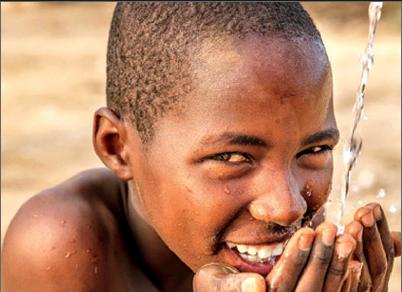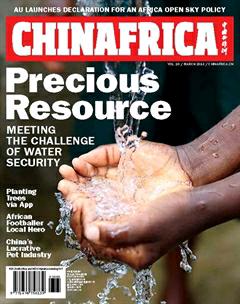Rising to the Challenge
By+Emefa+Abla+Adjei

like any other developing countries which face chronic challenges in the management and provision of basic amenities, Ghana continues to strive to improve access to potable water for its 28 million people.
Safe Water Network, an international NGO with an office in Ghana, estimates that more than 10 million people in the country lack access to safe water. Yet, despite this figure, the initiatives and strategies being rolled out by the government, stakeholders, donor agencies and development partners are hard at work to propel Ghana to attain the United Nations Sustainable Development Goals (SDGs), with Goal 6: Ensure access to water and sanitation for all.
As the global community celebrates World Water Day on March 22, Steve Manteaw, Policy Analyst of Integrated Social Development Center in Ghana, a public policy research and advocacy NGO, and member of the governments Public Interest and Accountability Committee, said that Ghana is not in a desperate water situation; however, there is a need for a clearcut policy framework to protect its water resources and manage human activities that affect the former. Touching on Ghanas water shortage that was widely reported in local media in January 2018, Manteaw said climate change and weather patterns affect water supply. The desertification of the savannah zone of Ghana is altering the rainfall patterns, thereby causing water scarcity, especially during the dry season, necessitating water rationing, he said.
He blamed the situation on the shortage of surface water accessibility, which is the easiest form of harvesting water for treatment and consumption. The shortage of surface water supply is also because of human activities - illegal mining and pollution of waterways, which has led to the process of sedimentation.
“We draw our water from river courses, so once there is silt deposited in the river beds, it makes rivers shrink and divert their courses into small tributaries, which are not sustainable water sources for treatment and consumption,” said Manteaw.
Underground water resources
Manteaw asserted that Ghana is not in a situation of desperation since there is an abundance of underground water which has not been tapped. He said while borehole systems are reliable alternative sources for human use, there is not yet a specific state policy to tap underground water.
In December 2015, the Chinese Government, as part of a concessional grant, signed a contract to construct 1,000 boreholes in six regions in Ghana.

According to the Community Water and Sanitation Age ncy(CWSA), a public sector organization in Ghana, the contract, which is valued at 138.3 million yuan ($22 million), is expected to run for three years, where 330 hand-pump boreholes were constructed in the each of the first and second year, and 340 boreholes in the final year.
With the construction of these boreholes and other initiatives by stakeholders in the water sector, Emmanuel T. Gaze, Director of CWSA Technical Services, told ChinAfrica that 64 percent of rural Ghanaians have access to potable water. According to Gaze, access to water means a person has 20 liters of quality water per day and shouldnt walk more than 500 meters to get access to that water.
Speaking on how water is vital to the attainment of the SDGs, Donald Agumenu, President and Founder of NGO Water for Rural Africa (WRA), based in Ghana, told ChinAfrica that the existing water situation calls for greater financial investments in the water sector by the government.
“Water security, like any other developmental issues, remains critical and plays a crucial role in attaining all the SDGs,” he said.“Poverty reduction, food security, education and health are very central to water.”
As a development partner in the water sector, WRA is committed to transforming the poorest and most marginalized communities in Africa by improving access to safe and clean drinking water and sanitation.
Through donor funds, WRA plans to construct 1,000 boreholes within two years across Africa for rural dwellers to enable them to access potable water. In addition, WRA is dedicated to providing strategic support in the domain of policy formulation and advisory, advocacy, research, education and awareness creation among others.
Addressing challenges affecting the water sector with regard to clean water sustainability, Agumenu said that the scourge of illegal mining, locally known in Ghana as galamsey, has polluted many of the water bodies in the country, which serve as a source of water for treatment and consumption.
These activities have affected largely rural dwellers that depend on streams, rivers and other outlets for water with complications of water-related diseases.
In December last year, Barbara Oteng-Gyasi, Ghanas Deputy Minister of Lands and Natural Resources, urged illegal miners to take advantage of the governments Multilateral Integrated Mining Project (MMIP), which offers alternative livelihoods for illegal miners and combats illegal mining. Oteng-Gyasi said MMIP would empower miners through teaching them employable skills. One example of the successful project is the acquisition of land and free seedlings to grow palm trees to earn a living. “Oil mills will be constructed under the MMIP for processing palm oil for export,”said Oteng-Gyasi.
Encouraging signs
Ben Ampomah, Executive Secretary of Water Resources Commission, established to regulate and manage Ghanas water resources, said that his organization is coming up with other legislative instruments to make people more accountable in the water sector.
“Water Resources Commission is mandated to regulate and manage Ghanas water resources and coordinate government policies in relation to them,” he said.
Experts agree that to fully protect Ghanas water security, government must be committed to investing in the sector and pay more attention to the issues affecting the sector, something they say has been lacking.
Safe Water Network has also called for the scaling up of small water enterprises (SWEs). These are off-grid community water systems, stations or kiosks (some with household connections) operated as local water businesses that provide consumers with a reliable source of safe and affordable water.
“With an operating footprint of[about] 100 SWEs in 10 regions of Ghana, SWEs have demonstrated the ability to deliver affordable and reliable safe water access in rural areas, including small towns and peri-urban areas,” says Safe Water Network. Ghanas National Water Policy, launched in 2007, assigned the responsibility of urban water provision to Ghana Water Co. Ltd. and rural and small towns water provision to local government authorities (district assemblies) with facilitation support by the CWSA. Although the policy supports SWEs and private sector participation(with approval from government agencies), there remain barriers to SWEs growth such as pricing and tariffs, financing, market segmentation and coverage agreements, exclusivity and lack of regulations.
The announcement of a new Ministry for Sanitation and Water Resources by the new Ghanaian Government last year was welcomed by all stakeholders who believe water and sanitation services can now get the attention it deserves.
“Poor people are disproportionately dependent on natural resources for their livelihood and are hardest hit by low water and sanitation service access,” said Agumenu. “Investing in the health of people, ecosystems and more efficient water use is an investment that not only provides immediate economic benefits, but also safeguards future economic gains. It leads to more businesses, better adaptive capabilities to climate variability and improved ecosystem services.”

